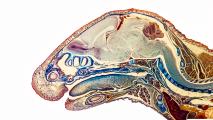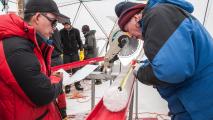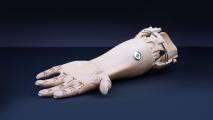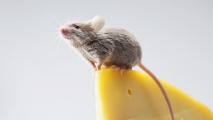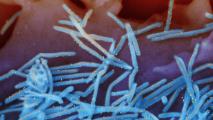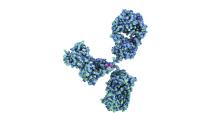
Biotech
Human history has been all but defined by death and disease, plague and pandemic. Advancements in 20th century medicine changed all of that. Now advancements in 21st century medicine promise to go even further. Could we bring about an end to disease? Reverse aging? Give hearing to the deaf and sight to the blind? The answer may be yes. And soon.
More
Using body bags to treat heatstroke
The Pacific Northwest heat wave crushed hospitals with heatstroke victims. Doctors turned to body bags to save lives.
Fecal transplants reverse aging in brains of old mice
Fecal transplants from younger to older mice appear to reverse aging in the brains of the seniors, improving their memories and cognition.
Ancient frozen viruses hold clues to life and climate
Using new techniques, researchers at Ohio State have identified ancient viruses we’ve never seen before.
New treatment may prevent heart damage from COVID-19
An experimental drug that stopped the coronavirus from entering cells in heart organoids may be able to prevent heart damage from COVID-19.
Series|
Challengers
26-year-old builds $8,000 mind-controlled bionic arms
Bionic arms used to cost $80,000. Now, a young engineer has lowered the cost by over 90%.
Hungry mice show why you should take study breaks
The spacing effect — a strange phenomenon by which you retain information more readily if you take study breaks — is now less of a mystery.
Already-approved ALS drug may help Alzheimer’s patients
A small phase 2 study has found evidence that ALS medication riluzole may have potential as a drug for Alzheimer’s.
Graphene foam sucks uranium out of contaminated water
MIT researchers have developed a graphene foam water filter that eliminates uranium contamination in hours.
Kenya’s GM cassava plant gets greenlight
Kenya is moving forward with developing a cassava plant that’s been genetically modified to resist cassava brown streak disease.
Pfizer’s RSV vaccine 100% effective in human challenge trial
An RSV vaccine developed by Pfizer was reportedly 100% effective in a small human challenge trial and caused minimal side effects.
Permanent hearing loss may be reversible
A new mouse study suggests we may be able to reverse permanent hearing loss in humans by tapping into a latent regenerative ability.
First neuron-level map of a monkey brain revealed
The first neuron-level 3D image of an entire macaque monkey brain could have a major impact on the world of neuroscience.
Researchers have created a brain sensor swarm
Researchers at UC Santa Cruz have developed an injectable swarm of nanosenors they hope will measure the brain noninvasively.
Pfizer has manufactured the first batch of Delta variant vaccines
Pharma giant Pfizer has already developed and manufactured ingredients for a COVID-19 vaccine targeting the highly contagious Delta variant.
Holograph tech “teleports” Olympic badminton competition
Japanese telecom company NTT is using holograph tech to recreate Olympic badminton matches at a venue 22 miles away in real time.
Helmet worn at home shrank man’s brain tumor by a third
A new brain tumor treatment shrank a man’s aggressive glioblastoma tumor by nearly a third — and all he had to do was wear a helmet at home.
Inside your nose, it’s bacteria vs. bacteria in the fight against meningitis
Researchers have found that nose drops containing “friendly” bacteria can protect people against meningitis-causing bacteria.
Adding one gene to rice and potatoes increased yields by 50%
The insertion of a gene found in animals prompted potato and rice plants to produce 50% more food and exhibit drought-resistant qualities.
Baby mice “dream” about the world before seeing it
Before the eyes of baby mice open, their brains appear to use retinal waves to prep their vision systems to detect objects and motion.
New antibodies may lead to a norovirus vaccine
Researchers have discovered antibodies that neutralize a variety of norovirus strains, a possible step toward an effective norovirus vaccine.
Get inspired with the most innovative stories shaping the world around us.














